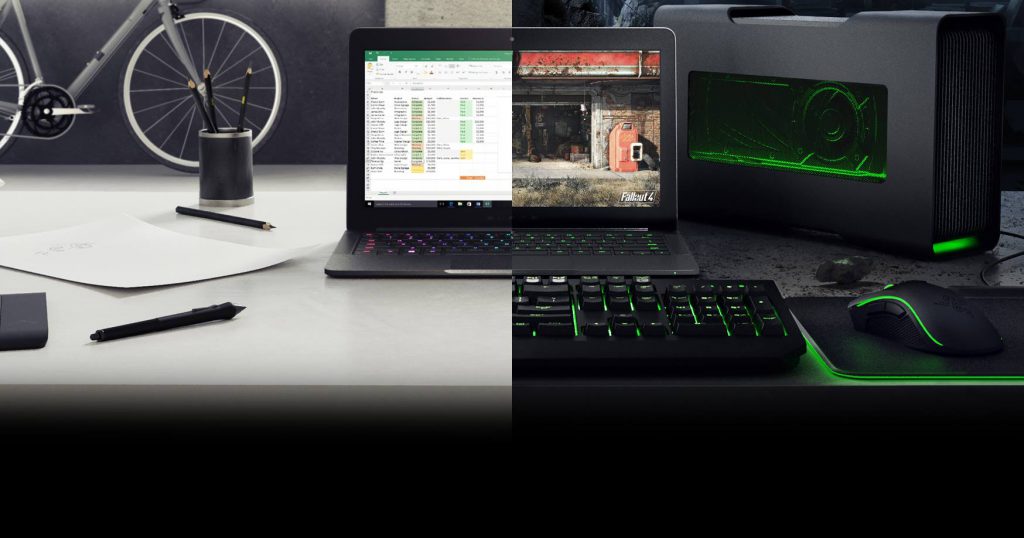Gaming peripherals are often regarded as childish, gaudy, and unnecessary by those who generally do not play games.
To these people, games like Battlefield 1, The Division, and Overwatch are not even a consideration to pass time; while brands such Razer, Logitech, and Logitech evoke images of gear-obsessed pre-pubescent nerds.
What they fail to realise is that because these peripherals are so in-tuned to handle the high sensitivity and multiple command inputs during gaming, that they have discreetly become a multi-tasker and creative professional’s’ perfect companions, and as such have become an integral office hack for people.
Today, we look at two specific items which you could change in your office setup to help you work that much more efficiently.
Gaming Keyboard

Let’s talk about the keyboard first.
One of the hallmarks of a really good gaming keyboard is that most, if not all gamers, prefer it to be of the mechanical sort.
And in case you didn’t know, the mechanical keyboard has its roots in the offices of the corporate world. Think the typewriter and the early computers that our parents would have used, before membrane keyboard technology became a more cost-effective solution for computer manufacturers, thus becoming widely adopted.

The added benefits of typing on a mechanical keyboard are also quite tangible.
First of all, you will make less mistakes. Each key is basically handling its own input, and because there is quite a bit of spacing between them, accidental presses are rare.
There is also confirmation that you actually hit something. Ever had those days when you typed on a consumer keyboard and missed out a letter even though you swore you tapped on the key? For mechanical keyboards, once you feel and hear a click, what you wanted on screen will appear.
If mechanical keyboards are too cumbersome and noisy for you, there is also another feature on gaming keyboards (even membrane ones) that will definitely be a lifesaver – Macro Keys.

Usually located to the left of the keyboard, and comprising anywhere from 5 to 18 additional keys, they are a set of customisable keys that you can map to any system function you desire – from the simple stuff like copy and paste, to even emptying your Recycle Bin.
Going beyond these additional keys, some manufacturers even enable you to remap any of the traditional key placements to anything you desire.
What used to take multiple key strokes and mouse clicks, can now be done at the press of a key.
Gaming Mouse
Painfully dragging the mouse across your entire mousepad just to get from one corner of the screen to the other is an inconvenience the modern professional can do without.
If I’m right, the mouse that you’re currently using in office is probably rated at 800-1000 DPI sensitivity.
The added benefits on top of higher DPI figures on a gaming mouse is that the sensitivity is adjustable as well, and on the fly. Dial the DPI down if you’re doing some precision work, and turn it up again for everything else.

Much like the keyboard, gaming mice also come with additional buttons that are programmable.
Most widely-used gaming mice usually have an upwards of at least 5 or more buttons, including your right and left clicks. The beauty of these mice is that you can configure what each click does – even your traditional right and left.
You could even potentially have an entire keyboard in your hands.
Mice that are typically designed for Massive Multiplayer Online (MMO) games typically have an entire number pad on their left side where your thumb usually rests.
Now, imagine for a second that every shortcut that you typically use in a work day is mapped right under your thumb…how awesome is that, right?

Finally, chances are, it’s more comfortable to use a gaming mouse for extended periods.
This is in part due to its ergonomics that is designed to fit the natural holding position of your hand on the mouse. Consumer mice are simple mass-produced moulds of the same shape, so forcing your fingers to rest on a surface that lacks contours can be awkward.
Looking Beyond Gaming

The main misconception of gaming gear is that they’re expensive – which is vastly untrue.
Much like any other tech gadgets, gaming peripherals also have different tiers for different budgets, which of course affects overall quality and functionality of each product.
Besides, the typical ‘gamer aesthetic’ has been toned down by a lot in recent times, with manufacturers recognising that not everyone wants their stuff glowing in 16.8 million colours.
More muted designs on gaming gear means that those who are conscious about appearing ‘unprofessional’ in the office have one less thing to worry about.
Coupled with simple-to-use accompanying software for you to do all your necessary mapping and customisations, gaming peripherals do not need a ton of guesswork to integrate into your workflow.

If talking from a purely ergonomics point of view, there are definitely options out there.
The Logitech MX Master mouse is one that is widely used by top content creators, and you will find a ton of positive reviews anywhere.

For a full desktop solution, Microsoft has long been releasing ergonomic centric products in their lineup.
Their Sculpt Ergonomic keyboard and mouse set has been designed to minimise stress in your hands and fingers while doing office work.

I am not saying that gaming peripherals are the be all end all to enhancing productivity.
If you are an IT programmer or developer, chances are, you’ll know of system software based scripts and codes that can do multiple actions far better than some macro keys.
But for the rest of us, having those extra keys and button could mean that you can leave work each day without fatigued and cramped hands and fingers due to all the finger gymnastics that you had to do.
Feature Image Credit: Razer













